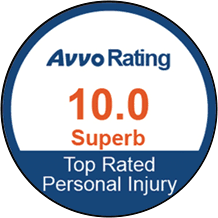Accidents caused by failure to warn defects can leave you with injuries that change your life forever. When a product is sold without the appropriate warnings about its potential risks, people can be harmed.
These dangers might range from hazardous chemicals in household items to malfunctioning equipment on job sites. If you or someone you care about was injured because a company failed to include the proper warnings or instructions, it’s normal to feel frustrated and unsure of your next steps.
Knowing your rights and pursuing fair compensation can make all the difference in how you rebuild your life after such an injury.
Schedule a Free Case Evaluation
Table of Contents
- What Are Failure to Warn Defects?
- Common Examples of Failure to Warn of Defects
- Recognizing Manufacturer Liability in New York
- Injuries Linked to Failure to Warn Defects
- What to Do While Healing from Failure to Warn Defects
- Compensation for Failure to Warn Defect Injuries
- Failure to Warn Defects FAQ
- Why You Should Pursue Justice
- Why Choose Queller Fisher as Your Strong Legal Advocate?
- Call for Help Today
What Are Failure to Warn Defects?

When manufacturers release a product into the market, they are responsible for warning users of any potential dangers. Failure to warn defects arise when this obligation isn’t met. These defects don’t relate to how the product was made or designed but rather to how its risks are communicated.
For instance, a pharmaceutical drug might require clear warnings about side effects or potential interactions. A power tool might need instructions about correct usage and handling to prevent accidents. Without these safeguards, users can suffer serious harm that could have been avoided if they had been informed of the risks.
Companies must meet their legal obligation to provide clear, direct, and noticeable warnings, especially in New York, where millions depend on tools, medications, and various products daily. The consumer often pays the price when these warnings are absent or insufficient.
Common Examples of Failure to Warn of Defects
Failure to warn of defects can occur in countless scenarios, but some of the most common examples include:
- Pharmaceuticals and Medical Devices
Medications must include detailed instructions about dosage and warnings about potential side effects. Medical devices, such as implants or equipment like ventilators, should describe risks associated with use or maintenance clearly. - Household Products
Items like cleaning agents, paints, or appliances should carry instructions and caution labels. Missing labels about toxic fumes, flammability, or improper use often lead to accidents. - Construction Equipment
Machinery or tools, such as industrial saws or forklifts, need explicit warnings about improper usage, blind spots, or maintenance schedules. Workers who are unaware of these dangers are at higher risk of injuries. - Children’s Products
Toys or baby gear, when not labeled properly with age recommendations or hazard risks, can lead to severe injuries for young users. Small parts in toys, for example, may create choking hazards that parents are not warned about.
When manufacturers fail to address these risks through proper labeling and warnings, they can be held liable for damages caused by their negligence.
Recognizing Manufacturer Liability in New York

Product liability laws are in place to protect consumers from preventable harm. When it comes to failure to warn defects, New York’s legal system recognizes the importance of holding manufacturers, distributors, and marketers accountable for negligence.
To prove liability, your case may require showing the following:
- Lack of Adequate Warnings
The product did not include clear, visible, or sufficient warnings about its potential dangers or appropriate uses. - Causal Link to the Injury
The absence of those warnings directly resulted in your injury. - Realistic Use of the Product
You were using the product in a way that could reasonably be expected, not for unintended or overly improper purposes.
For example, if an industrial worker followed the provided instructions for a piece of equipment, but an undisclosed mechanical hazard caused injury, the company might be liable.
Similarly, if you consumed a drug as prescribed, only to experience unlisted severe side effects, you may have grounds to seek legal action.
Injuries Linked to Failure to Warn Defects
The harm caused by improper warnings can vary based on the product, the user, and the circumstances of the accident. Common types of injuries linked to such defects include:
- Burns or chemical injuries from improperly labeled cleaning agents or inflamed machinery.
- Poisoning due to missing allergy or dosage precautions on medication.
- Broken bones or head injuries caused by malfunctioning equipment or unsafe toys.
- Repetitive strain, long-term conditions, or respiratory illnesses from using products without warnings about prolonged exposure risks.
These injuries can leave you with significant medical bills, therapy costs, lost wages, and endless pain and suffering. Taking action ensures you aren’t left to shoulder this burden alone.
What to Do While Healing from Failure to Warn Defects
Recovering from an accident tied to failure to warn defects can be physically and emotionally taxing. That’s why focusing on your healing should remain a priority while also taking steps to safeguard your legal rights.
Here’s what you can do during your recovery:
- Seek Medical Attention Immediately
Even if your injuries initially seem minor, ensure you get a thorough medical evaluation. Keep all documentation, including doctor’s visits, prescriptions, and hospital records. - Preserve Evidence
Do not discard the product in question. Keep it, along with its original packaging, labels, and instructions (or lack thereof). These serve as vital pieces of evidence in your case. - Take Photos and Notes
Photograph the damage caused by the product, including injuries, the surrounding environment, or aligned hazards. Write down exactly what transpired and how the product was used. - Keep Track of Expenses
Note medical bills, therapy expenses, lost income due to time away from work, and other financial impacts of your injury. - Consult with a Professional Immediately
Given New York’s statutes and product liability laws, time limits exist to file claims. Prompt action ensures crucial evidence doesn’t degrade or vanish.
Compensation for Failure to Warn Defect Injuries

Victims of failure to warn defects may be entitled to different types of compensation, including:
- Medical Expenses
From emergency hospital care to physical therapy and long-term treatment, these costs can and should be covered. - Lost Wages
For time off work during recovery or inability to return to your prior job capacity. - Pain and Suffering
Monetary equity for the physical pain, emotional distress, and diminished quality of life resulting from the injury. - Punitive Damages
If the manufacturer knowingly distributed a defective product without warnings, you could be eligible for punitive damages to deter similar behavior in the future.
Compensation can provide you with the resources needed to recover without financial strain and hold negligent parties accountable for their actions.
Failure to Warn Defects FAQ
1. How is a failure to warn defect different from a defect in design or manufacturing?
A failure to warn defect occurs when a product's risks are not adequately communicated to the user, such as missing labels, unclear instructions, or lack of warning about potential hazards.
This is distinct from a design defect, where the product is inherently unsafe due to its design, or a manufacturing defect, where an error occurred during production.
2. What types of warnings are required by law for products sold in New York?
Products sold in New York must have clear, visible warnings that explain potential risks, proper usage, handling instructions, and any environmental hazards.
Additionally, warnings should be placed on the product or packaging in a way a reasonable user would notice, and they must comply with federal and state regulations.
3. What happens if I was using the product differently than described in the instructions?
If the usage was outside the product’s intended purpose, the manufacturer might argue that they are not liable. However, New York law considers if your use was “reasonably foreseeable.”
For example, if a product could clearly be used in multiple ways but failed to warn about risks tied to those uses, you may still have a case.
4. Are rental or leased products also covered by failure to warn defect laws?
Yes, companies renting or leasing products are obligated to ensure the items provided include necessary warnings. This could apply to construction equipment, vehicles, or tools rented for temporary use.
If an injury occurs because warnings weren’t provided, the rental company could also share liability.
5. Can I file a failure to warn claim if I didn’t purchase the product but was injured by it?
Yes, you don’t need to be the purchaser to file a claim. New York law allows anyone injured by defective warnings on a product to hold the manufacturer accountable, whether you were borrowing, renting, or simply in the proximity of the product when the injury happened.
6. How long do I have to file a lawsuit for a failure to warn defect in New York?
New York generally imposes a three-year statute of limitations for personal injury cases, including those arising from failure to warn defects.
The time limit begins on the date of the accident or injury. Acting quickly is mandatory, as gathering evidence and building a case can take time.
7. Do product recalls affect my ability to file a claim?
No, a product recall doesn’t prevent you from pursuing compensation. If a recall was issued after your injury, it might even strengthen your case by showing the manufacturer acknowledged the product’s risks.
However, claims must still prove that inadequate warnings and the lack of action caused the injury.
This FAQ provides a closer look at concerns victims often have regarding failure to warn defects. If you have additional questions or want to learn more, reach out for further assistance.
Why You Should Pursue Justice
Preventable injuries shouldn’t shatter lives. Holding corporations or manufacturers accountable isn’t just about recovering compensation for your injuries; it’s about setting a precedent that improper warnings won’t be tolerated.
Every legal claim sends a powerful message that consumer safety should always be a priority.
Why Choose Queller Fisher as Your Strong Legal Advocate?

The legal process can be complex when it comes to failure to warn defects. You need a team well-versed in product liability laws to build a strong case for you.
Our commitment to helping victims of product-related injuries stems from years of experience tackling similar cases across New York City and its surrounding neighborhoods, including Brooklyn, Queens, Nassau, and Suffolk counties.
We have achieved monumental victories, recovered over a billion dollars in damages, and changed thousands of lives for the better.
What sets us apart?
- Proven Record
With decades of experience in product liability and personal injury law, we offer the professionalism and care your case deserves. - Focus on Your Recovery
We handle the legal work so you can focus on healing and moving forward after your injury. - Strength in Advocacy
Whether it’s through settlement negotiations or trial representation, we pursue every case with vigor.
Our belief is simple: Consumers injured by negligent corporations deserve justice. Holding those responsible ensures future product safety improvements.
Call for Help Today

If you or a loved one has suffered harm because of failure to warn defects, take the first step toward reclaiming your future. Contact the experienced team at Queller Fisher to discuss your case.
We listen, advise, and help you understand the options available to you.
Call us today at (212) 406-1700 for a free consultation.
Queller, Fisher, Washor, Fuchs & Kool - New York Office
233 Broadway #1800,
New York, NY 10279
Ph: (212) 406-1700